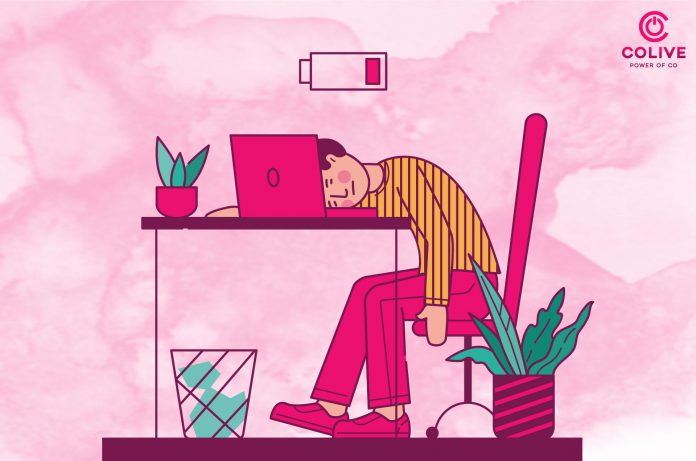As millennials, we are optimistic about career and towards our life goals. We have a list of tasks in our respective job profiles and there’s a true thirst to prove ourselves better than others. Such is the case with all the contemporaries around us who like to put work before life and are determined to achieve their goals. But as a millennial, have you considered that you might be dealing with work burnout?
Work burnout? Is burnout real? Yes, it is — it might be lurking somewhere around you and stopping you from working efficiently, without coming to your sight. But what exactly is work burnout? Mayo Clinic defines work burnout as a state of work-related stress that brings in reduced accomplishment and loss of personal identity. It can be common among millennials who contribute long hours at work, working hard to achieve their targets.
A study by Gallup on around 7,500 full-time employees revealed that 23% of the employees felt work burnout very often or always. A few other numbers found were shocking as well with some other 44% reported the same sometimes. This essentially meant that around two-thirds of the total workforce was feeling work burnout quite frequently — which surely is a frightening result of the survey.
The survey further revealed that employees facing work burnout are 63% more likely to often go on sick leave and 2.6 might even be actively looking out for other job opportunities. Work burnout may even lead to less confidence among the employees, affecting their overall performance and 23% of such employees are likely to visit the emergency rooms in their offices.
Symptoms of Work Burnout
To understand more about work burnout and its impact on the employees and the overall institution, in the long run, let’s first get to know about some symptoms of it:
- Becoming cynical or critical at work
- Becoming irritable/impatient with coworkers, customers, or clients
- Lack of concentration
- Lack of satisfaction from your work
- Unexplained headaches, bowels or stomach problems
- Change in sleeping patterns
Have you been experiencing any of the above symptoms? Be aware, you might be facing work burnout. Some people may define these symptoms to be of depression or loneliness yet these may be the reasons you are facing work burnout lately.
Related: Demystifying the best ways of working efficiently and effectively
The main causes of Work Burnout:
There might be many reasons why you are facing work burnout at your workplace. Though many corporate employees might find it hard to know exactly why and when they are facing work burnout in their companies, much like defining the traits, knowing the causes are easy too. Now that we have the symptoms of work burnout among employees, let’s identify some common causes of work burnout:
- Biased treatment at work
The corporates often do not remain untouched from politics and favoritism. It can found even in many institutions and organizations we would have never thought of. Some employees can be preferred more in an institution based on their skills and capabilities over others but this may leave other employees distressed, thus making them feel work burnout.
- Too much workload
Sometimes to meet certain targets, corporates require their employees to contribute extra working hours. But being loaded with too much work can bring in a lot of stress and sometimes issues like lack of motivation to work, lack of sleep, and many more. Thus, too much workload surely proves to be a major contributor to work burnout.
- Over-expectation at work
Most corporate employees today work long hours on stricter schedules and there is an evident thirst in them to prove themselves worthy among their coworkers. This even leads to their team leaders expecting too much from them, and thus this over-expectation and pressure at work lead to work burnout for the employees.
- Lack of support and effective communication
This is especially the case with the new joiners in a firm, who often find a lack of support from team leaders. Without their support, they find themselves lonely and insecure towards their job and thus end up doing too much work, leading to work burnout.
- The thirst to fulfill deadlines at work
Most corporates today put certain deadlines at work, under which the employees have to complete the assigned tasks. Sometimes those deadlines are unrealistic and to complete the tasks in the stipulated time, employees tend to work more than their capabilities. This surely leads to work burnout, stress, and even depression.
How to cope with a burnout at work?
Now that we have discussed the symptoms of work burnout and the causes of it. Let’s come up with the solution to this rising issue among the contemporaries today. Here are a few ways of avoiding burnout at work:
-
Consider having a definite ‘Work-life Balance’

Work-life balance — while most millennials working for long hours might hate even venturing to utter these three terms, bringing the same into action might nearly seem impossible for this generation. But maintaining a healthy balance between the two should be an essential task. It should be considered as essential as your daily work.
This is because a healthy work-life balance means, a healthy, stress-free brain. And being mentally stress-free and healthy will surely help you deal with your frequent work burnouts.
-
Learn the art of saying ‘no’ for reducing work burnout

Starting to work for a corporate firm brings in a lot of responsibility for all young employees. But have you been blindly nodding your head to everything you are asked for? If yes, prepare yourself for facing work burnout at a young age.
This may seem a scary situation but learning to say ‘no’ sometimes might just do the work. While instructions coming directly from your clients or your boss can never be ignored you can ignore some tasks or unnecessary meetings and focus first on the priority tasks. This will not only help you work efficiently but will also help reduce work burnout.
-
Overwork ≠ more productivity

As millennials, all of us have to work for at least 8-9 hours a day at our workplaces to complete the day’s tasks. This essentially means that on an average you work for around 400-450 hours a week but this frequency may go far beyond 600 hours if you work for a startup. But does overwork means more productivity for you?
How about working smart instead? This necessarily doesn’t mean working inefficiently but dividing your day’s tasks in such a way that all of them can be easily done within the stipulated time. You can efficiently reduce your burnout by applying the ‘2 minute-rule’ or even skipping some unnecessary tasks and focusing more on the important ones.
-
Take a break from your work to reduce work burnout

‘I accomplish all my tasks on time’ / ‘I am a workaholic’ — might be your reason to work extra hours at your workplace. But you are surely inviting a lot of stress and work burnout home, even when your work for the day is done. We would say, you should consider taking a break from your work.
Taking a break from work doesn’t mean frequently going out with friends and demanding leaves from your management (pun intended!). It means taking small breaks from work at regular intervals to stay stress-free and declutter your mind. You might consider going out to walk for a short distance and even taking a tea break to reduce your work burnout.
-
What does your job mean to you?

Before joining a company, the most basic questions asked by an employer to you include: Why do you want to work with us? or, Where do you want to see yourself in the next five years? Though these questions are just asked to test your capabilities and diligence but have you ever considered asking yourself what does your job mean to you?
If not, do it right now! This will surely bring your life goals and aspirations right in front of your eyes and motivate you to think beyond your job. Not only will this motivate you but will also reduce work burnout manifold.
-
Bring-in Creativity to Your work

Working for long hours may bring in a lot of stress in your life but with a little creativity, the tables may turn. If you’re a marketer, you can devise creative strategies to bring in more tractions or you can even ask your colleagues to suggest you innovative ideas to make your work efficient.
This will surely help you complete your task effectively and will help you cope up with all the daily workloads in a creatively and innovatively.
-
Learn outside your work

Human life always brings in a new lesson to learn at every stage — this isn’t some quote from some Guru or a wise man but is a practical lesson we’ve all learned while growing up. Even while not working, there are many f things to be learned from outside — whether it’s a musical instrument or a new recipe.
This will bring-in more creativity and efficiency in your work, but will also promote a fresh mind before starting your work and the strength you will need to deal with stress.
-
Reduce your work burnout by sharing

Though at this age, sharing your pain points and stress with your family and friends might feel immature but it is a healthy habit to keep your mind stress-free. Talk to your family members, friends, or your partner about the mental stress you’ve been undergoing. You will surely feel better and they might even give you a healthy solution to cope with your daily work burnouts.
-
Do Something that energizes you

What do you do after you reach home after work? Probably binge-watching your favorite TV series, isn’t it? But even after spending 9-10 long hours of work, you are forcing your brain into doing something useless and inviting more stress into your life instead.
Instead, you can do something better like reading a book, listening to music, or even spending some time with your kids or pets at home — something which moves you and declutters your mind into thinking positively.
-
Get in sync with your body

You’ve been tirelessly working for long hours at your workplace but how about giving it a good relaxation before beginning your work the next day? This is where getting in sync with your body comes into play. This can be achieved through exercises, yoga, and even meditation. This will not only help you relax but will also reduce stress and work burnout.
Have you been feeling less motivated to work lately? This might be because you’ve been facing the symptoms of work burnout and stress. Job-related burnout and stress are common among the millennials, yet keeping your mind healthy is important too. Though in recent years, staying and eating healthy has become a trend, people often ignore mental health, calling it merely a phase in life. But only a healthy and stress-free mind can bring-in more productivity to your work. So, why not follow the above 10 ways of recovering from exhaustion and stress?
Coliving can also be the best way to deal with stress and work burnout with fun activities along with Colivers to share your interests with. Colive is one of such players in the market, which promotes a healthy, stress-free lifestyle alongside fully furnished, tech-enabled, designer, and luxurious homes to reside in at an affordable price. Visit our website and upgrade your life with the Colive Way!






